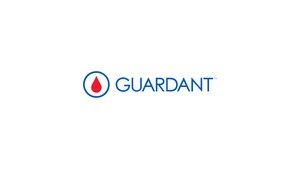New Studies Demonstrate the Need for and Utility of Comprehensive Liquid Biopsies
Prospective Clinical Outcome Study Supports the Guardant360® Assay
REDWOOD CITY, Calif., June 27, 2017 /PRNewswire/ -- Two recent studies demonstrate the unmet medical need for and the clinical utility of a highly sensitive comprehensive liquid biopsy to help manage the treatment of advanced cancer patients, Guardant Health announced.
In one study, researchers showed that logistical challenges – such as a lack of tissue for sequencing – often prevent community oncologists from obtaining basic genomic testing results for patients with advanced non-small cell lung cancer (NSCLC). The other study showed that patients whose treatment was selected based on the results of the Guardant360® assay responded to treatment at rates similar to patients whose therapy was selected based on tissue testing. The Guardant360 assay is the first commercial comprehensive liquid biopsy supported by a prospective, peer-reviewed clinical outcome study.
"These important findings confirm what thousands of Guardant360-ordering physicians have experienced in their clinics," said Dr. Richard Lanman, Guardant Health's Chief Medical Officer. "When Guardant360 results are used to guide treatment decisions patients respond to matched therapy at the expected rates, while avoiding repeat invasive biopsies."
The study "Genomic Profiling of Advanced Non–Small Cell Lung Cancer in Community Settings: Gaps and Opportunities" appeared in Clinical Lung Cancer, while "Prospective Feasibility-Study for Utilizing Cell-free Circulating Tumor DNA Guided Therapy in Refractory Metastatic Solid Cancers: An Interim Analysis" appeared in JCO Precision Oncology.
Genomic testing in advanced lung cancer can help doctors match their patients to targeted therapies that may be less toxic than traditional chemotherapy. But logistical issues associated with obtaining these results can limit the number of patients who receive even the most basic genomic testing, the authors of the Clinical Lung Cancer paper found. Clinicians often find it difficult to perform the recommended testing for EGFR, ALK, and other drug target alterations because there is either a complete lack of tissue or insufficient tissue from a biopsy. Less than 60 percent of patients in the study met the guideline recommendations for EGFR and ALK testing, and only 8 percent were tested for alterations in all seven genes included in the NCCN NSCLC guidelines.
"The guidelines recommend broad genomic testing in all patients with advanced non-small cell lung cancer, but adherence is often impractical in the community setting because of the challenges of working with small tissue biopsies," said Martin Gutierrez, head of thoracic oncology at John Theurer Cancer Center, and lead author on the study. "Less invasive, comprehensive testing with the Guardant360 assay could help with guideline adherence, and ensure that all patients are being evaluated for a possible targeted therapy option instead of chemotherapy. This is something we've observed in our own practice."
For the JCO Precision Oncology study, researchers from the Samsung Medical Center in Seoul prospectively enrolled 194 patients with advanced lung, gastric, and other solid cancers and measured their response to treatment that was selected based on Guardant360 results. Patients responded to the matched therapies at expected rates, the study found.
The Guardant360 assay is the most validated comprehensive liquid biopsy and was the first to be commercially introduced in 2014. It examines tiny fragments of circulating tumor DNA (ctDNA) that are released into the blood stream by dying tumor cells, and can provide advanced cancer patients a genomic profile of their cancer without requiring an invasive biopsy. The test is now the most widely used comprehensive liquid biopsy and has been ordered more than 40,000 times by more than 3,500 oncologists.
About Guardant Health
Guardant Health is focused on conquering cancer by using its breakthrough blood-based assays, vast data sets, and advanced analytics. Using both molecular and digital tools, Guardant Health is addressing challenges across the cancer care continuum. The company has raised more than $500 million from leading investors. Its first product, the Guardant360 assay, came to market in 2014, and is now the most widely ordered comprehensive liquid biopsy commercially available. In 2016, it announced Project LUNAR, an effort to apply Guardant Health's technology platform to early detection, recurrence monitoring, and assessing minimal residual disease. Guardant Health and Guardant360 are registered trademarks of Guardant Health, Inc.
SOURCE Guardant Health
Related Links
WANT YOUR COMPANY'S NEWS FEATURED ON PRNEWSWIRE.COM?
Newsrooms &
Influencers
Digital Media
Outlets
Journalists
Opted In





Share this article